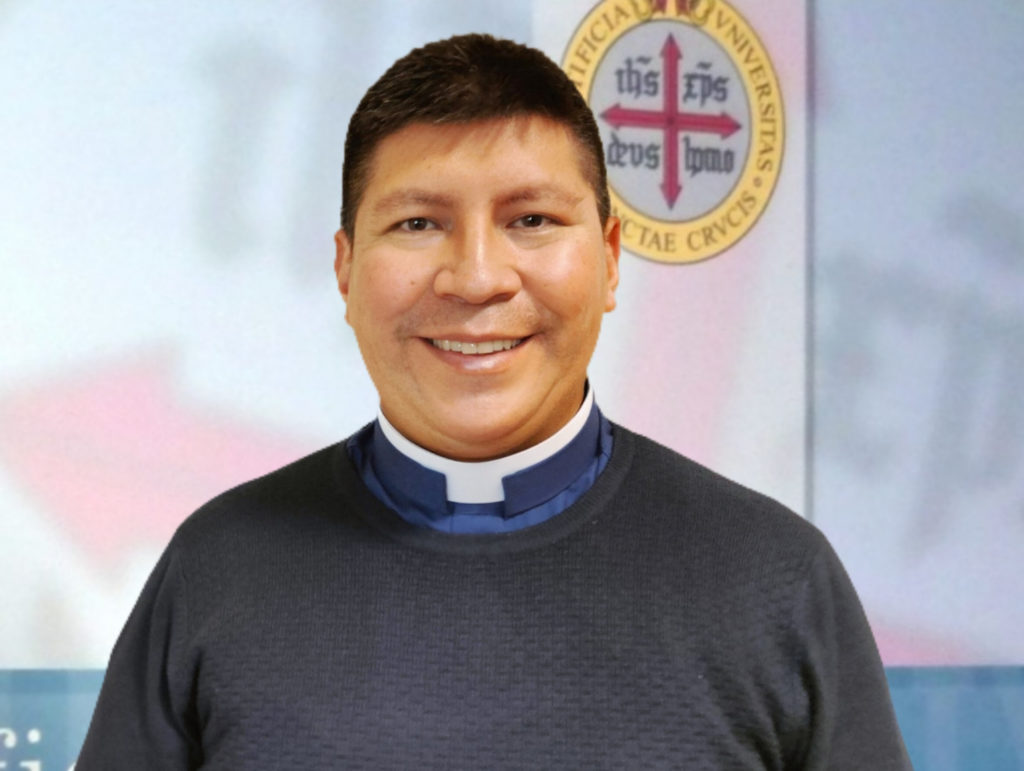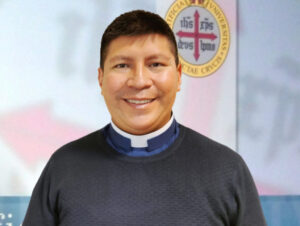
I thank God for being a Christian and for the faith that my family has passed on to me in a simple way. I come from indigenous roots. My parents are of Quechua descent. My mother is from the province between Potosi and Chuquisaca and my father from Sucre. Due to the family situation, my parents had to migrate from the countryside to the city and it was there that they met.
They dedicated themselves to a simple trade because they could not study in school. My father learned the tailor's trade and my mother worked as a maid.
The economic situation has not been easy for my parents and my four siblings. I am the youngest. To date my family has no home of its own, although my older siblings have studied and have been able to form their own families. This is something that my father sees from Heaven, as he died two years ago.
When I turned 13, I took the initiative to prepare for my first communion. Catechism helped me to discover the Lord more and that is how I got closer to the parish where we went to mass in the center of the city. I collaborated in my free time with the priests in a space called oratory, which was also an activity of personal and community recreation.
After two years I gave up this parish activity due to demands at home, but I felt a great emptiness. I needed to be close to the community life of the church. So I got organized and started going to the neighborhood parish. The priest immediately made me a catechist for first communion children and an altar server.
This youthful stage was very nice for me, although I had to organize my free time well, with the house chores. Later, I abandoned these parish tasks for my duties in high school and pre-military service.
"When I turned 13, I took the initiative to prepare for my first communion. Catechism helped me to discover the Lord more and that's how I got closer to the parish."

Iván Bravo Calvimontes is a diocesan priest from La Paz, Bolivia. He was ordained a priest on May 12, 2011. He is 37 years old and comes from a family of indigenous roots. He has been pastor for ten years of a parish of indigenous Aymara and peripheral.
When I finished high school I thought about various university careers in the social field in order to be of service to humanity and society. My parents also encouraged me to become a professional in this field, because they saw my abilities and qualities in me and so I could get out of poverty.
But something different was inside me, because I was eager to learn about life in a formation house to become a priest. So I asked and they put me on the road with the vocational ministry of my parish.
When I told everyone at home about my vocation, they were speechless. They did not expect me to enter a seminary. But my decision was a free and conscious one, although I cannot deny that I was sorry to leave my family and my personal plans.
However, something greater than my strength gave me the courage to do it. The day I was leaving home they were aware that it was a very mature step on my part, a decision they accepted because they realized that it was a very mature step on my part. that we children should be happy in vocational discernment for life.
In my priestly formation I met priests of Opus Dei who heard my confessions, encouraged me and accompanied me. After I was ordained a deacon, I was invited to circles for priests where I felt very good, and that's how I met St. Josemaría, to whom I entrusted myself in different circumstances of my life.
"When I told everyone at home about my vocation, they were all speechless. However, something greater than my strength gave me the courage to do it. The day I was leaving home they were aware that it was a very mature step on my part, a decision they accepted because they realized that we sons must be happy in vocational discernment for life."
"My diocese has been going through difficult times since long before the pandemic. For this reason, many priests of the jurisdiction have not had the opportunity to pursue higher studies, due not only to the variation of the national currency with foreign currency, but also to the socio-political situation in Bolivia, where the Church still faces persecution and there is a decrease in vocations.
However, the new archbishop did not give up and bet on the qualification of the clergy. This is how we accepted the possibility of studying at the Pontifical University of the Holy Cross in Rome, in spite of the complex situation our local Church is going through," says Father Ivan.
I was ordained a priest on May 12, 2011. In 2017, I was assigned as parish priest in a parish of indigenous Aymara and peripheral.
I continued to attend the retreats for diocesan priests offered by the Work and so it was that in the year 2021, after ten years of my service in the parish, my bishop made me see the need to pursue higher studies.
From the moment this possibility opened up, I put everything under God's will. The financial expenses were high, because my diocese has been going through difficult times since long before the pandemic.
Therefore, many priests of the jurisdiction have not had this opportunity, due not only to the variation of the national currency with foreign currency, but also to the situation The Church is still facing persecution and a decrease in vocations.
However, the new archbishop did not give up and bet on the qualification of the clergy. This is how we accepted the possibility of studying at the Pontifical University of the Holy Cross, despite the complex situation that our local Church is going through.
I had never left my country before and I had to do everything from scratch to be able to access these studies. It is wonderful because everything is new to me. For this reason, I am very grateful to the Lord for the gift of studying at the Pontifical University of the Holy Cross in Rome.
All I know is that Father Josemaría has allowed me to be there. here. I am giving the best of myself to what I have to live in this beautiful experience of faith and life. At the University, we realize that the Lord is in our midst because Catholicity is palpable.Priests from America, Europe, India, Australia, Africa.
We speak of God, we live for Him and we celebrate in communion, configuring ourselves to Jesus in Good Shepherd, to sanctify daily life. Thanks be to God and to those who make it possible for us to be formed and to return to our countries with the joy of the Gospel, being sent as disciples and missionaries.
With gratitude a servant in Christ and Mary.